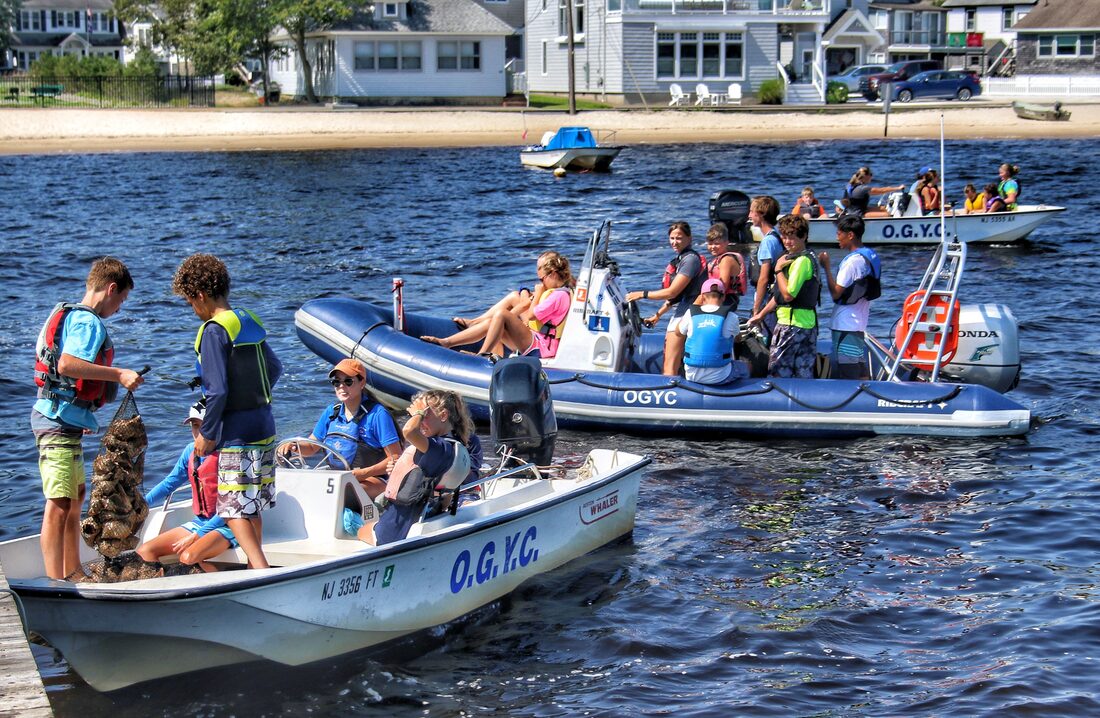|
On Thursday, July 25, at 10 a.m. the American Littoral Society and supporters used a parade of boats to carry the latest batch of oyster babies from our nursery in Ocean Gate, NJ to a reef site off Good Luck Point in Barnegat Bay. "The oyster nursery and parade are part of the Littoral Society's Operation Oyster program, which aims to improve water quality in New Jersey's bays and estuaries, as well as improve coastal resiliency through re-establishing natural oyster reefs" said Capt. Al Modjeski, the Habitat Restoration Program Director for the Littoral Society. "This program not only restores a lost part of our coastal ecology, it directly engages the community in conservation through activities like the Parade of Boats." The Parade of Boats will also be a celebration of the expansion of the Littoral Society's work in Barnegat Bay, through a $1 million Water Quality Restoration Grant from the New Jersey Department of Environmental Protection. That grant is part of $10 million grant program from the state aimed at improving Barnegat Bay. This new work will focus on using what the Society has learned in previous restoration work with oyster reefs and living shorelines. "The Society is deeply committed to the protection and restoration of Barnegat Bay," said Tim Dillingham, Executive Director of the American Littoral Society. "We have worked for years to reduce pollution ailing the Bay, as well as developing and demonstrating workable solutions throughout the watershed. "Our oyster restoration work will soon also help in promoting coastal resiliency as we add new reefs in Lacey Township," Dillingham added. "New oyster reefs there will help improve water quality, provide new oysters and habitat to the Bay, and reduce community vulnerability. We have answers to Barnegat Bay's problems and we are putting them to work." Funding for the 2019 Parade of Boats was provided by Conserve Wildlife Foundation of New Jersey through their National Oceanographic and Atmospheric Administration (NOAA) grant to remove and repurpose derelict crab pots collected in Barnegat Bay. To date, over 1800 pots have been recovered, reused, and recycled. The Society has been repurposing the pots to make Whelk-come mats to collect naturally occurring oysters and create oyster cages used in growing oysters. The oyster larvae used in the oyster nursery were donated by Jenkinson's Aquarium of Point Pleasant, NJ. Over-harvesting and decades of pollution, accelerated by rampant development, have decimated New Jersey's natural oyster population. Oysters help keep water clean and oyster reefs help protect the coastline. They are nature's water filters, each one is able to clean up to 50 gallons of water a day. Oyster reefs also serve as speed bumps for waves during storms. The Good Luck Point oyster restoration project, funded by NOAA and Restore America's Estuaries (RAE) in 2015, was a collaborative effort led by the American Littoral Society, with support from Ocean Gate and Berkeley Township. Other partners include Monmouth University's Urban Coast Institute, which executed baseline mapping of the reef site using remote operating underwater vehicle (ROV) and side scanning techniques, ReClam the Bay, which provided support for biological sampling and assistance with spat tank bay-side assembly, and Stockton University. The Good Luck Point Marina has also been instrumental in the project. Further work and monitoring was funded by the Barnegat Bay Partnership once restoration was complete. Since 2015 the Littoral Society has raised oyster babies at the Ocean Gate spat tank. Oyster larvae, which are nearly microscopic in size, are added to the tank where they attach to shell and begin to form baby oysters, also known as spat. As part of Operation Oyster, the Littoral Society also raises baby oysters in a spat tank at the Oyster Point Hotel in Red Bank, NJ and, with the of help of volunteer Oyster Wranglers, has begun monitoring the Navesink and Shrewsbury rivers for future oyster work. The Society has also engineered several oyster reefs off restored beaches on New Jersey's Delaware Bay. Those reefs help reduce erosion from beaches that horseshoe crabs use for breeding and shorebirds use for feeding. In addition to those other projects, Operation Oyster includes the "Shuck It, Don't Chuck It!" shell recycling program. Over a dozen restaurants in Ocean and Monmouth counties participate in the "Shuck It, Don't Chuck It!" effort, which is generously supported by The Lusty Lobster and a grant from the Marta Heflin Foundation. It was created as a way to reduce waste going to landfill and as a method to obtain material for building oyster reefs. Additional Operation Oyster support has come from Metrovation, a property ownership and management company that operates The Grove at Shrewsbury and Brook 35 Plaza, the National Fish and Wildlife Foundation, Conserve Wildlife Foundation, NOAA, The Bonney Read restaurant, and Toadfish Outfitters.
Brenda
7/26/2019 12:15:56 pm
An organization dedicated to improving the water quality in the bay leads a big parade of boats ... each with a gasoline engine. Comments are closed.
|
Archives
July 2024
Categories
All
|


